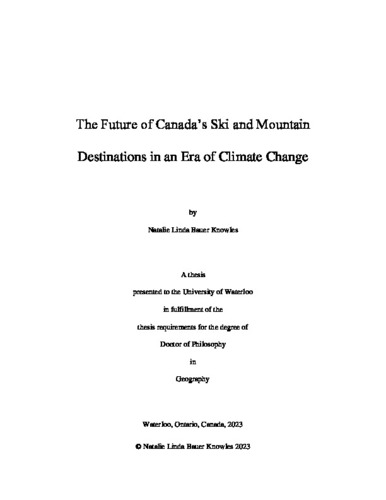| dc.description.abstract | Climate change represents a grand challenge for society and the far-reaching risks for the global tourism sector is no exception. As one of the largest sectors globally, tourism is not only highly impacted by the biophysical impacts of climate change but is also a major source of greenhouse gas emissions contributing to anthropogenic climate change. Tourism’s entrenchment in global socio-ecological systems mean that how tourism identifies and responds to climate change risks will have extensive implications for sport, recreation, livelihoods, culture, real estate, infrastructure, and community resilience in tourism destinations worldwide. While the international tourism sector has highlighted climate change as the primary threat to tourism sustainability, lack of viable climate change adaptation and mitigation strategies raise fundamental questions about the place of tourism in a warmer and decarbonized future. Considering the urgency and salience of these questions for winter tourism specifically, research on highly climate sensitive ski tourism provides important learnings and potential leadership for other tourism sectors that will inevitably face transformative risks as climate change accelerates.
This dissertation therefore investigates the complex physical climate and carbon risk within the Canadian ski and mountain tourism system to explore potential pathways towards sustainability and climate resiliency. Canada's diverse ski tourism industry provides an exemplary case study to identify the range of climate and carbon risks, investigate climate adaptations, and understand other socio-ecological factors contributing to or hindering climate impacts, responsiveness, and resilience. Through three interrelated studies, this dissertation combines qualitative and quantitative methodologies using a tourism geography lens to; (1) apply industry-specific climate risk modeling, (2) conduct empirical analysis on the sustainability of snowmaking as a climate adaptation, and (3) understand diverse and inter-connected stakeholder climate risk and response perspectives. Through this process, the research aims to understand the "wicked" challenge of climate change in complex tourism systems, provide information needed for relevant and dynamic climate response planning, decision-making and action, and enable discussions on sustainability transformations and climate resilient futures for diverse mountain tourism destinations.
Findings suggest climate risk and resilience is relative across temporal and spatial scales, with potential cross-regional implications for competitiveness and demand patterns. Empirical assessments of snowmaking as a climate adaptation further demonstrate that the national scale is too coarse to evaluate (mal)adaptation or sustainability, instead showing how regional and destination-scale differences in climate impacts, tourism markets, ecosystems (e.g., water availability), energy sources result in differing assessments of adaptation sustainability. Multi-stakeholder narratives situate modelled and observed climate and carbon risks within complex socioeconomic systems and identify diverse actors, structures, and perspectives influencing destination-scale climate (in)action and potential levers to affect more transformative change towards climate resilient futures.
More broadly, this dissertation broaches important sustainable tourism and climate change theories, concepts and paradoxes including: temporal and spatial scale, relative climate risk (impacts and adaptive capacity); private-public sector relations and responsibility; (mal)adaptation; scope 3 emissions and current-future tourism mobility; tourism growth and decarbonization; pluralistic value(s) of tourism and sustainability; top-down vs bottom up decision-making; and climate justice, with the aim of extending the important conversation on [sustainable] tourism’s place in a decarbonized economy and warmer world. In investigating the intersection of these research questions, this dissertation presents novel conceptual frameworks, empirical analysis and participatory methods which could be replicated in other tourism contexts and applied to support ski tourism operators and local mountain communities responding to climate change. | en |

